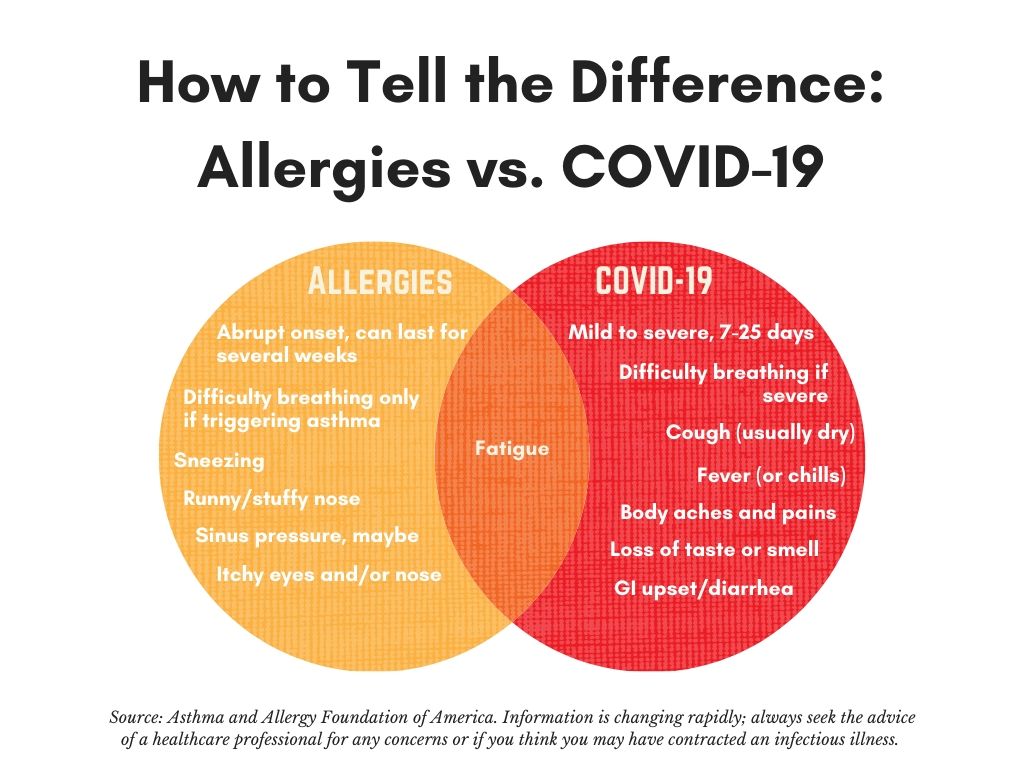Right about now, if you are like thousands of people in the Pacific Northwest, your allergies may be at their worst and driving you into a sneezing frenzy! The tricky part is, we’re also in the middle of a pandemic. So you may be wondering, “Is this an allergy attack, or is it COVID-19”?
Take a deep breath. (Achoo!) We’ve got you covered. Read on to learn the difference between allergies and infections. You’ll also learn what you can do about it – no matter what’s going on.

As you can see from the graphic above, there are several key differences between allergies and the viral illness COVID-19. Itchy, watery eyes and sneezing with a runny nose are classic allergy symptoms that are not generally associated with COVID-19. But this does not mean you have to suffer through allergy season! Read on for ways to treat these annoying symptoms.
How to get relief from seasonal allergies
Keep pollen outside
Of course we all want to be outside once the weather starts to warm up. If you’ve been to a park, or working in the garden, consider showering and changing your clothes when you come inside for the day. This will keep you from bringing allergens into your bedroom where they could disrupt your sleep.
Shoes off
Leaving your shoes at the door will prevent you from tracking pollen, dust and molds throughout your house. This is also an effective way to keep bacteria and other pathogens out of your house.
Filter it out
A good HEPA filter in your bedroom, and if possible, your main living space, will help keep the air in your home easier to breathe, especially if you are sensitive to smoke and volatile chemicals from traffic. Check out Consumer Reports guide to air purifiers for good options.
Get tested
Skin allergy testing, sometimes referred to as “skin prick testing”, is an effective method of determining which pollens, molds, animals, fungi or foods you may be reacting to. Natural Medicine of Seattle performs these tests, which take less than an hour. Call our office for more information on getting yourself tested.
Get treated
Once you have a positive test, you have a couple of options. You may be familiar with allergy shots, which involve going to an allergist’s office for injections, which are aimed at desensitizing you to your specific allergies. While effective, this treatment method can be prohibitive for some people due to time constraints involved in traveling to an office every week, and discomfort associated with needles. Another method, and the preferred treatment at Natural Medicine of Seattle, is Sublingual Immunotherapy, or SLIT therapy. This involves simply applying a few drops of a prescription formula tailored to target your allergies under your tongue once a day. Most people find it convenient and effective.
Additional supplements for allergy relief
Below are a handful of supplements we frequently prescribe to assist in reducing symptoms of allergies. Be sure to talk with your doctor before starting any new treatment regimen to be sure it is safe for you.
- Vitamin C
Most people know Vitamin C is helpful during cold and flu season, but it also helps the body break down histamine (the compound in the body that causes the itchy eyes and runny nose of allergy season). The right dose is different for everyone, as it can cause diarrhea in those who are sensitive to it. - Quercetin
This helpful antioxidant stabilizes mast cells, which release histamine. When mast cells react, called degranulation, histamine is released and we feel the effects in the form of allergy symptoms. It can be found in several over the counter allergy formulas and is generally well-tolerated. - Nettle leaf
Nettles (Urtica dioica) grow everywhere in the Pacific Northwest during the early Spring months. Use caution if you choose to harvest them on your own, as they have thorns that can be very painful. Fortunately, nettle leaf tea is readily available, and the dried leaf powder is often part of over the counter allergy formulas. - Green tea
The compounds in green tea may decrease the release of histamine from mast cells, working similarly to quercetin.
If you want to make sure your symptoms are just allergies…
…reach out to a licensed Naturopathic Doctor to discuss your risk and testing options. The doctors at Natural Medicine of Seattle are offering in-depth telehealth visits to address acute concerns as well as your overall wellness needs. We are here for you!
*All information provided on the Natural Medicine of Seattle blog is for informational purposes only, and should not be considered as medical advice. Please do not implement any treatment program without speaking with your doctor first.

